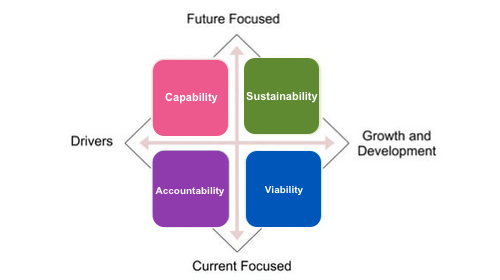Four Abilities for Grants
Grant writing is as much about strategic planning and project management as it is about your writing abilities. This is where the, Four Abilities for Grants, comes in.
Authored by: iClick2Learn Team
Translate Text
Table of Contents
Introduction
It doesn’t matter how great your project is, or the results you say your project will deliver, if you don’t address the application criteria.
Most, if not all, grants are scored and ranked according to how well the application addressed the specific criteria outlined in the application. If your application doesn’t score high, it’s unlikely to be successful.
Grant writing is as much about strategic planning and project management as it is about your writing abilities. This is where the, Four Abilities for Grants, comes in, and they are:
- Capability
- Sustainability
- Viability
- Accountability
In this article, we will discuss the capability of your organisation to deliver the program or project you are wanting funding for.

Capability
Capability is about the capacity and ability of your human resources.
Many applications today focus on your organisation’s capacity to deliver on the grant and they will either ask you this explicitly or they will address it in their criteria or assessors scoring sheet.
Here’s are 4 simple questions to ask yourself:
- Do you have the skills, knowledge and industry know-how to demonstrate that you have the capacity to deliver the outcomes?
- Does your team have the ability to work on the project?
- Do the members of your target group/clients/users have the ability to undertake and fulfil their requirements of the project?
- If you are running on volunteers, do your volunteers have the capacity to commit the number of hours in volunteer time needed to get the project completed?
So, how might we take an objective view of measuring ourselves against the first of ‘The Four Abilities’?
Ask yourself, if you were to outsource an organisation to run a project such as yours what are you looking for? What skills and experience do you expect the successful group to have? Make up a list of all the things you are looking for. Check the funders guidelines and see if there is anything that needs to be included in your list.
Then take an honest, hard look at your organisation and ask yourself if you are the best organisation to be doing this project. Where are the gaps? What would you need to do or prove too ‘win’ the outsourcing contract? If you were judging yourself out of 10, what score would you give for each of those areas you listed earlier? Why?
At this point, if you don’t have high scores and aren’t full of confidence that you have the capacity to deliver then STOP and re-think. Brainstorm with a few others about how you can get around the troubling areas – perhaps partner with another organisation or get support from consultants or council.
You could potentially be wasting a whole lot of time on a grant application if you can’t honestly and confidently fulfil this requirement. While some grant providers will directly ask you the question about your capacity to deliver, others may not, but as an assessor, I can guarantee you they are looking for it!
The next article will discuss addressing sustainability in your grant application.
Sustainability
Sustainability is about being able to continue something for a long time without using or completely destroying your resources.
Funders and sponsors will either implicitly or explicitly question the sustainability of your project, so don’t think, if there isn’t an explicitly direct question about sustainability that it won’t apply to you.
There could be references to sustainability without actually using the word, or the word could be hidden in the 20+ pages of guidelines and grant program information.
Now, I want you to stop thinking that you can’t make a project sustainable – just because you can’t have a fee for a service business model that helps you roll out a program again next year, it doesn’t mean you can’t introduce sustainability throughout your program.
In other words, you don’t need cash to carry on the benefits. You need to start asking yourself what you can do to continue to deliver on the benefits beyond the period of funding.
This is really important to funders and it demonstrates that you aren’t after a cash grab. You really want the outcomes to continue and it also helps you think creatively about how to address this issue if you can’t make it pay.
I know service delivery is service delivery and there’s no getting past the issue of needing a human to deliver that service which costs you money. Stop thinking about the resources and start thinking about how to make the outcomes sustainable.
Here are a few questions to ask yourself:
- How will the project continue beyond the funding you are receiving?
- How will the outcomes and outputs you have identified continue beyond the funding?
- Will this project really benefit your organisation, is it going to help you become more sustainable?
- If not, it may sound like a ‘cash-grab’ so why are you doing it?
By addressing these points in the relevant questions throughout your application, you will demonstrate that your organisation and the project is a low risk and that you are the best organisation to partner with the funding body to achieve their/your goals.
In the next article will be discussing how to address viability in your grant application.
Viability
When I say viability, you might start thinking about dollar signs. But viability is not just about financial viability. Sure, it’s part of what we’re talking about but remember that it’s only a small part of it.
Viability questions if the project has the right elements to be delivered and achieve successful outcomes. So where do we start? We need to take off the blinkers and really take a good hard look at what we’re doing, and why we’re doing it.
Some questions to ask about the project:
- Do you have a track record of delivering similar programs?
- Is the program you’re proposing really going to work in your community? Just because it’s worked in another community well, doesn’t mean it’ll work well in yours.
- Is your project right for the target users? Have you forgotten or missed any user groups that would benefit?
- Is there really a demonstrated need from your target users?
- How have you measured the need to determine the demand?
Some questions to ask of your organisation:
- Are you a financially viable organisation?
- Are you the best organisation to be delivering this – does it align strategically with your objectives?
- Do you have any ‘skeletons in the closet’ like funding projects that have previously gone awry or ones you haven’t acquitted on?
- Do you have enough cash at the bank to cover liabilities – are you solvent?
While we’re talking about financials, another consideration is, do we have too much money in our bottom line or reserves? If so, this might actually hinder your chances at the decision table.
If you look too cash rich the funder will just think ‘Organisation A has the money to do it vs Organisation B who doesn’t, so we’ll fund Organisation B’.
Think like an assessor who is reading the grant applications. What you would want to see if you were going to hire a contractor for the project development and delivery. Make up a need, want and wish list and see how well your application performs against it.
The last of the four abilities is accountability, which we’ll discuss in the next article.
Accountability
Last but not least, we’re talking about your governance systems and processes. It’s amazing how some people switch off when you mention the word policy or procedure.
If this isn’t your forte then ask someone else in your organisation to assist. Whilst we have left this to the last, it’s one of the most critical factors that determine success.
You can meet the other three abilities to 100% but if you don’t have foundational governance to support the project, then it just won’t happen.
A basic example of this – and a very familiar tale – is when the person who was driving the project leaves the organisation. Suddenly the project falters or fails because no-one is interested or has any accountability for the project.
Then there’s the acquittal and you’ll want to give that job away when you realise there is so much information missing that you need. This is a very hard job indeed; trying to complete acquittals after the fact can be a very frustrating process.
It’s for these reasons and a whole lot more, that funders are taking a closer look at the accountability and governance systems of organisations.
You’ll also need to demonstrate that you have statutory governance processes in place. Most funders want to ensure that you comply with statutory requirements such as conflicts of interest and confidentiality. Do you have a code of conduct or a confidentiality agreement?
Here’s a few things to think about:
- Do you have a register of interests you maintain?
- Do you have policies and procedures that are used and updated?
- What are your risk identification and management practices like?
- What about an audit?
- What are the accountability systems you have in place to govern the project and your organisation?
Keep these four abilities in mind when writing your next grant application to improve your chance of success.
Here’s a quick review of the four abilities to improve your grant writing success:
Capability
Your organisation’s capacity to deliver on the grant.
Sustainability
The ability for your project or program to continue, even after the grant funds have been exhausted.
Viability
Does your project have the right elements to achieve successful outcomes?
Accountability
Your governance systems and processes, including evaluation, reporting and acquittals.
- Tags | Grant, Grant Writing, Grants, Tender Writing
